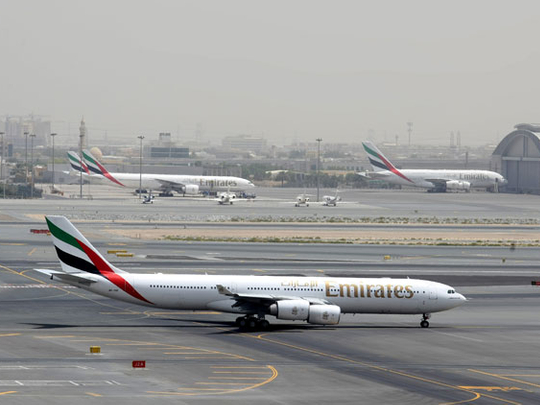
New York: Emirates said it will combat a profit squeeze from higher fuel costs by slashing fares to fill its 500-seat Airbus A380s, heightening competition for Air France-KLM and British Airways.
Emirates will resist the urge to cut routes and flights as oil prices threaten the profitability of some destinations and instead aims to stir up demand with cheaper tickets, Tim Clark, the Dubai-based carrier's president, said in an interview.
"I can understand how irritated some airlines become, because 43 per cent of our daily costs are for fuel, and it's out of our control," Clark said last week in Paris.
"But the last thing you should contemplate is capacity reduction. It's easy to do, but it has sounded the death knell for so many carriers."
Risky strategy
Industry practice has generally been to halt growth when times are hard and costs high, focusing on the most profitable routes that can sustain higher fares. That strategy is risky because it hurts sales and destroys confidence among passengers, airports, holiday companies and businesses in destination cities, so that traffic often never returns, Clark said on June 20 after a visit to the Paris Air Show.
Qatar Airways Ltd. Chief Executive Officer Akbar Al Baker said that the second-biggest Middle Eastern carrier may operate 190 planes by 2020, 60 more than envisaged, as it follows Emirates in building a long-haul transfer hub to rival London, Paris and Frankfurt.
Etihad Airways, the regional No 3, is also committed to adding new jets and routes, CEO James Hogan said in an interview in London.
Clark cited US-based Trans World Airlines Inc and Pan American World Airways as major carriers that went bust during his career after fatally paring back their networks.
Emirates will stick with a rapid-growth model based on building Dubai into a high-volume, inter-continental travel hub using a wide-body fleet featuring 90 A380 superjumbos with 45,000 seats, Clark said.
While cutting fares to sell tickets on the 517-berth planes will push up the occupancy level needed to break even, the impact of government spending cuts in many overseas markets means that strategy is more likely to succeed than one based on curbing capacity and raising fares, he said.
Emirates had an 80 per cent occupancy level in the year to March 31, when it boosted passengers 14 per cent to 31.4 million and lifted net income 43 per cent to Dh5.93 billion on sales that rose 26 per cent to Dh57.4 billion.
Top priority
"There is a wave of austerity in Europe from France and the UK to Ireland and Greece, and people are concerned about that," Clark said.
"But what has changed in the last 20 years is that whereas travel used to be way down the list of priorities, people now rate it as the No 1 thing they want to do. So we need to stimulate demand and get back to pricing levels that are affordable for the customers while still giving us a margin."
Deutsche Lufthansa AG and British Airways have already slashed costs after oil surged to more than $145 (Dh532) a barrel in 2008, sending jet fuel to a record $4.36 a gallon, and have little room left for manoeuvre, Clark said.
Airlines will probably achieve a collective profit of $4 billion this year, 54 per cent less than previously forecast, the International Air Transport Association said June 6, citing the impact of higher oil prices, Arab unrest and the Japanese earthquake and tsunami.









